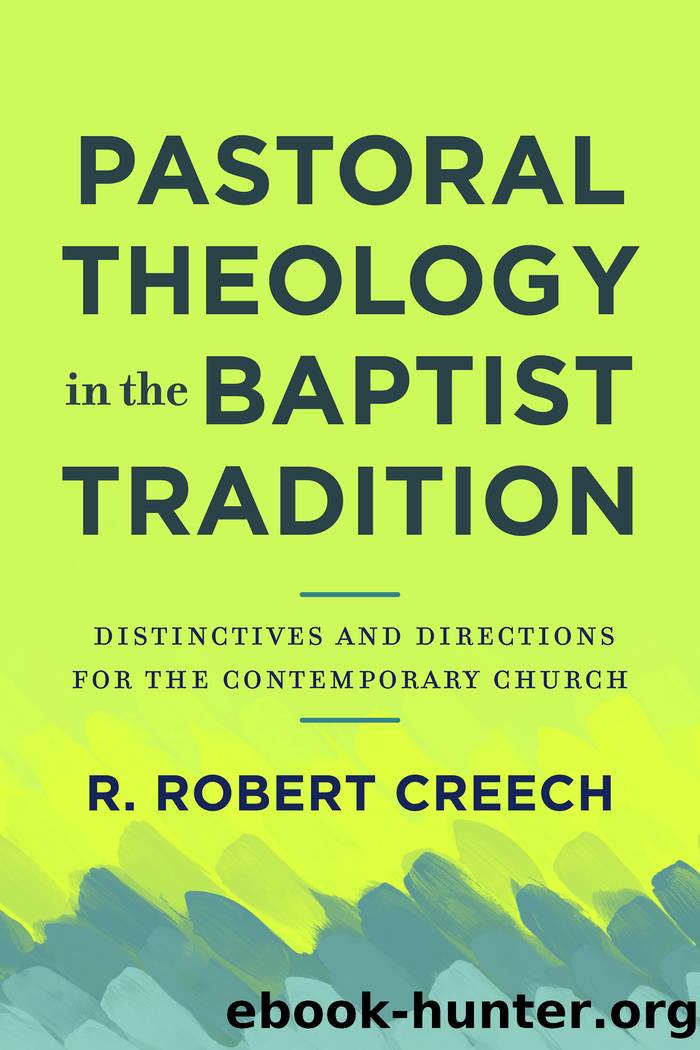Pastoral Theology in the Baptist Tradition by R. Robert Creech

Author:R. Robert Creech
Language: eng
Format: epub
Tags: Pastoral Theology;Pastoral theology—Baptists;REL074000;REL108000;REL073000
Publisher: Baker Publishing Group
Published: 2021-09-22T00:00:00+00:00
Theological Reflection
A biblical sense of âsentnessâ accompanies the call to ministry that leads to becoming a pastor. A pastorâs work entails personally sharing the good news of Jesus Christ with those who do not yet know him and equipping the congregation to do the same.
Pastor as Cultural Anthropologist
Pastoral ministry is inherently contextual. It takes place in a specific location, amid a particular culture, among people who speak a certain language and share common values and practices. As one whom God sent to this place, the pastor seeks to understand the culture of the world where they intend to bear witness. Part of comprehending the culture is to be like the two hundred chiefs of Issachar under David, âwho understood the times and knew what Israel should doâ (1 Chron. 12:32 NIV). The age in which we live, not just the place, is also the context to which God has sent us.
James McClendonâs volume on Christian witness explores the churchâs relationship to the world, calling his effort a âtheology of culture.â43 We understand that âmissionariesâ sent to some distant destination must learn the language, customs, beliefs, and traditions of those they go to serve. Over the past half century, changes in Western society have required the same kind of devotion to understanding the culture in which we minister. The church in the West can no longer assume even a basic understanding of the Christian story among those we are attempting to evangelize. George Hunter says that we, like the ancient church, are up against âignositicsâ: people who simply do not know the biblical story.44 Moral assumptions that once made sense of sin no longer resonate with this audience with whom a profound moral relativism has taken hold. The gospel now contends with what researchers Christian Smith and Melinda Lundquist Denton term âmoralistic therapeutic deismâ rather than first-century idolatry.45 This cultural shift ought to impact the theological education in which men and women engage as they prepare for ministry.
Pastors who minister with a sense of having been called and having been sent respond compassionately to their world. They come to their work with a holy curiosity about these people to whom God has sent them. Who are they? What do they believe? What are their chief concerns in life? What are their fears? How do they communicate? The pastor has endless questions to ask of the place. Listening becomes a primary skill for evangelism. Asking, listening, observing, and adapting, the missionary pastor and congregation learn to bring the gospel to the unique culture of the time and place to which God has sent them.
McClendon says that the church is a pilgrim people, not entirely at home in the culture surrounding us. But membership in the people of God remains an open invitation: âWhosoever will may come.â This openness of the church to all human beings creates, McClendon says, both a policy and a problem. âThe policy is evangelism, or more broadly, witness: authentic Christian existence is always missionary, possessed only to be imparted to others.
Download
This site does not store any files on its server. We only index and link to content provided by other sites. Please contact the content providers to delete copyright contents if any and email us, we'll remove relevant links or contents immediately.
| Anglican | Baptist |
| Book of Common Prayer | Calvinist |
| Episcopalian | Inspirational |
| Lutheran | Methodist |
| Pentecostal & Charismatic | Presbyterian |
| Quaker | Seventh-Day Adventist |
| Shaker | Theology |
Angels by Billy Graham(1922)
How To Be Born Again by Billy Graham(1777)
Peace with God by Billy Graham(1683)
Unbroken Curses by Rebecca Brown & Daniel Yoder(1573)
God's Prophetic Symbolism in Everyday Life by Adam Thompson & Adrian Beale(1494)
The School of Biblical Evangelism by Ray Comfort(1437)
Call by Rick Joyner(1425)
Martin Luther: The Man Who Rediscovered God and Changed the World by Eric Metaxas(1398)
Power over the Enemy by John Osteen & Joel Osteen(1351)
Jonathan Edwards: A Life by Marsden George M(1234)
Fresh Wind, Fresh Fire by Jim Cymbala(1233)
Liturgy of the Ordinary by Tish Harrison Warren(1219)
Prayers That Bring Healing and Activate Blessings: Experience the Protection, Power, and Favor of God by John Eckhardt(1216)
Unmasking the Devil: Strategies to Defeat Eternity's Greatest Enemy by John Ramirez(1205)
The Supernatural Power of a Transformed Mind Expanded Edition: Access to a Life of Miracles by Bill Johnson(1199)
An Altar in the World by Barbara Brown Taylor(1193)
Reformation Theology by Littlejohn Bradford(1186)
Martin Luther by Mansch Larry D.; Peters Curtis H.;(1131)
Seeing the Voice of God: What God Is Telling You through Dreams and Visions by Smith Laura Harris(1126)
